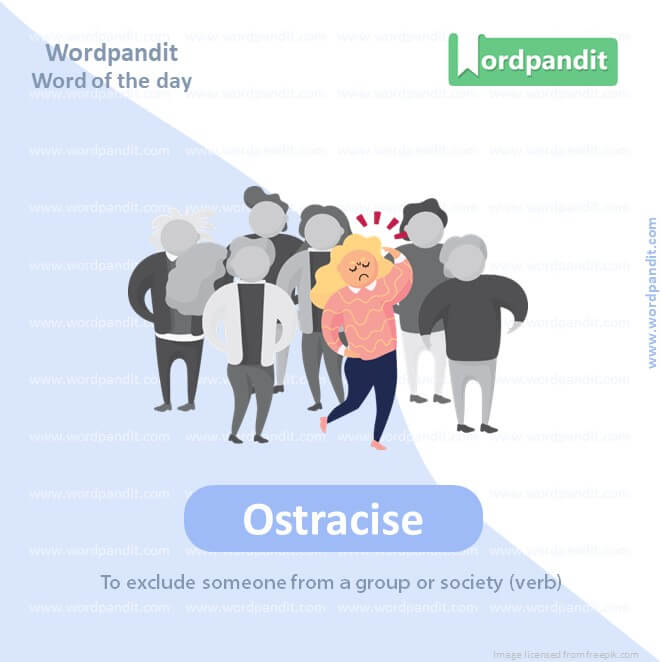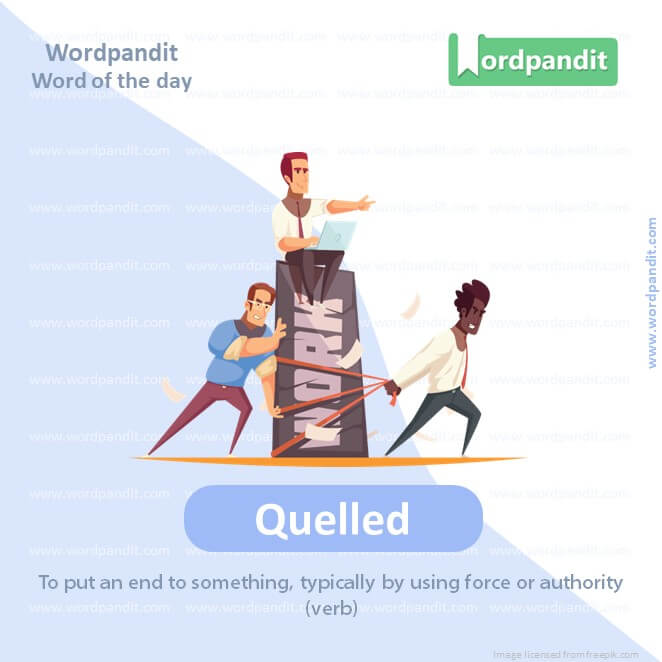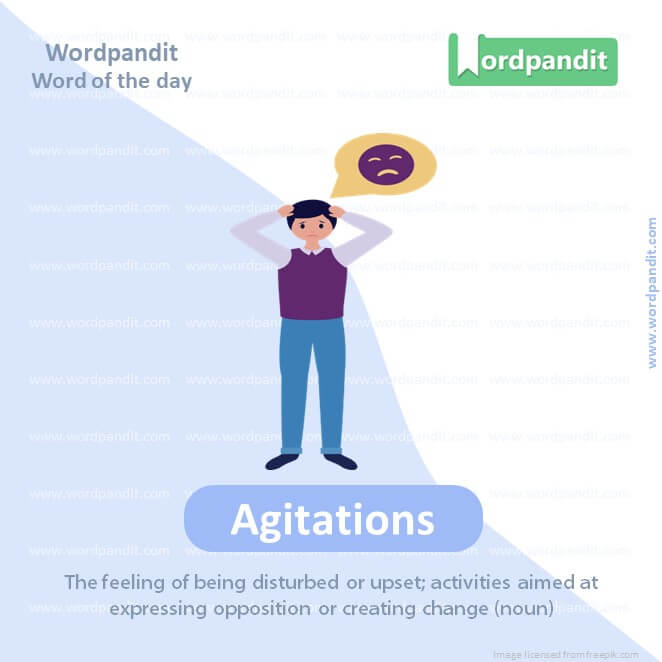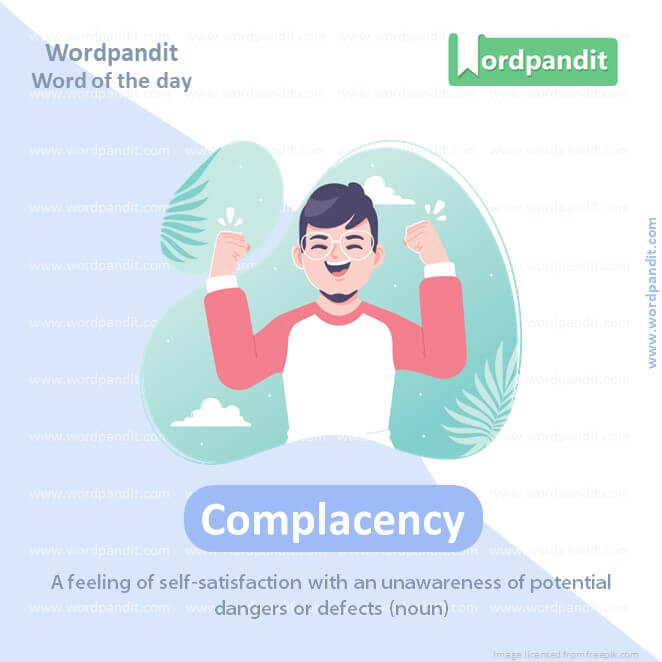Daily Vocabulary Words: List of Daily Used Words in Leading Indian Newspapers
Hi there. Welcome to this special section @ Wordpandit. Our endeavour here is straightforward: highlighting daily vocabulary words that you would come across in leading newspapers in the country. We have included the following newspapers in our selection:
• The Times of India
• The Economic Times
• Hindustan Times
• Mint
• Indian Express
We are putting in extensive work to develop your vocabulary. All you have to do is be regular with this section and check out this post daily. This is your repository of commonly used words; essentially, we are posting a list of daily used words. Hence, this has significant practical application as it teaches you words that are commonly used in leading publications mentioned above.
Visit the website daily to learn words from leading Indian newspapers.

WORD-1: Ostracise
CONTEXT: The minorities felt this was a means to ostracise them. A wave of protests followed, with some violent clashes with police at several locations, in which 65 people were killed.
SOURCE: Hindustan Times
EXPLANATORY PARAGRAPH: Imagine there’s a group of friends who always play together. One day, they decide not to talk to one of their friends because they’re upset with him. That friend feels left out and sad because he can’t play or talk with them anymore. Ostracising someone means leaving them out on purpose, not talking to them or including them in activities.
MEANING: To exclude someone from a group or society (verb).
PRONUNCIATION: ˈɒstrəsaɪz
SYNONYMS: Exclude, Shun, Snub, Ignore, Banish
USAGE EXAMPLES:
1. The community ostracised the family because of their beliefs.
2. He was ostracised by his peers after the scandal.
3. She felt ostracised at work after the argument with her boss.
4. The group ostracised him for breaking the rules.

WORD-2: Quelled
CONTEXT: Long sit-ins were staged at Shaheen Bagh in New Delhi and other parts of India, providing the western media with grists for their mills. But Covid-19 quelled these agitations, and the government, too, decided it was best to put the NRC on hold, taking a cue from the failure of the Prafulla Kumar Mahanta government’s experiment in Assam in the 1980s with terrible results.
SOURCE: Hindustan Times
EXPLANATORY PARAGRAPH: Imagine you’re at a party and two of your friends start arguing loudly. You tell a funny joke that makes them laugh and forget about the argument. The noise and the fighting stop because of your joke. Quelling something means stopping something bad, like a fight or a noisy argument, making everything calm again.
MEANING: To put an end to something, typically by using force or authority (verb).
PRONUNCIATION: kwɛld
SYNONYMS: Suppress, Subdue, Calm, Pacify, Stifle
USAGE EXAMPLES:
1. The teacher quelled the disturbance in the classroom.
2. The police quelled the riot quickly.
3. She quelled her feelings of panic and remained calm.
4. His apology quelled the argument that had started.

WORD-3: Agitations
CONTEXT: Long sit-ins were staged at Shaheen Bagh in New Delhi and other parts of India, providing the western media with grists for their mills. But Covid-19 quelled these agitations, and the government, too, decided it was best to put the NRC on hold, taking a cue from the failure of the Prafulla Kumar Mahanta government’s experiment in Assam in the 1980s with terrible results.
SOURCE: Hindustan Times
EXPLANATORY PARAGRAPH: Imagine you’re really excited and can’t sit still because you’re going to the amusement park tomorrow. You might jump around, talk a lot, and not be able to focus. That’s like feeling agitated. Agitations are when you’re so worried, excited, or upset that you can’t relax.
MEANING: The feeling of being disturbed or upset; activities aimed at expressing opposition or creating change (noun).
PRONUNCIATION: ˌædʒɪˈteɪʃənz
SYNONYMS: Unrest, Turmoil, Excitement, Disturbance, Stirring
USAGE EXAMPLES:
1. The news caused agitations among the public.
2. His constant pacing showed his agitations about the interview.
3. The workers’ agitations led to a strike.
4. Environmental agitations have increased awareness about climate change.

WORD-4: Digitisation
CONTEXT: The Centre requires finances to fulfil hundreds of essential tasks, including defence, infrastructure development, and digitisation. The entire country benefits from these services delivered by the Centre, rather than just a state.
SOURCE: Hindustan Times
EXPLANATORY PARAGRAPH: Imagine taking all your drawings and using a magic scanner to put them into a computer. Now, instead of holding the paper, you can see your drawings on the screen and send them to friends far away. Digitisation is like that magic scanner. It’s when you take information that’s not in a computer and change it so a computer can read and store it.
MEANING: The process of converting information into a digital format that can be processed by computers (noun).
PRONUNCIATION: ˌdɪdʒɪtaɪˈzeɪʃən
SYNONYMS: Digitalization, Computerization, Conversion, Encoding, Electronic formatting
USAGE EXAMPLES:
1. Digitisation of records makes it easier to find and share information.
2. The library is in the process of digitisation of its old manuscripts.
3. Digitisation has revolutionised how we access music and books.
4. The digitisation project aims to preserve historical documents.
WORD-5: Versus
CONTEXT: You may recall that Karnataka CM Siddaramaiah raised the issue of Hindi versus Kannada at the end of his previous tenure.
SOURCE: Hindustan Times
EXPLANATORY PARAGRAPH: Imagine you’re playing a game where you’re on one team, and your friend is on another team. You’re trying to see who can win. “Versus” is a fancy way of saying “against” or “compared to,” like when two teams play each other in a game or when comparing two things to see how they’re different.
MEANING: Against (used to indicate opposition or comparison between two entities) (preposition).
PRONUNCIATION: ˈvɜːsəs
SYNONYMS: Against, Opposed to, In contrast to, Compared to, In competition with
USAGE EXAMPLES:
1. Tonight’s game is the Sharks versus the Eagles.
2. The debate topic was nature versus nurture.
3. In the court case, it was Johnson versus Johnson.
4. She was weighing the pros versus the cons of her decision.
WORD-6: Chanted
CONTEXT: The older generation would recall the 1980s, when a massive crowd had chanted “Ayodhya to bas jhhanki hai, Kashi-Mathura baaki hai” (Ayodhya is just a glimpse, Mathura-Kashi will be next).
SOURCE: Hindustan Times
EXPLANATORY PARAGRAPH: Imagine you’re at a sports game, and everyone around you is saying the same thing over and over again to cheer for their team. They might say, “Go team, go!” many times. That’s chanting. Chanted means repeating words or phrases loudly and together with others to show support or make a point.
MEANING: Repeated rhythmically and collectively aloud words or phrases (verb).
PRONUNCIATION: tʃæntɪd
SYNONYMS: Sung, Recited, Yelled, Hollered, Vocalized
USAGE EXAMPLES:
1. The fans chanted the player’s name.
2. Protesters chanted slogans for peace.
3. The crowd chanted in unison to show their support.
4. The monks chanted prayers during the ceremony.

WORD-7: Complacency
CONTEXT: It should also shock the complacency of analysts who posit linear outcomes based on simplistic principles that the Pakistan military controls everything.
SOURCE: Hindustan Times
EXPLANATORY PARAGRAPH: Imagine you’ve won so many video games that you start to think you can’t lose. You stop trying hard because you think you’re good enough already. That feeling of being too confident and not wanting to improve or be careful anymore is called complacency. It’s when you’re satisfied with how things are and don’t want to make them better.
MEANING: A feeling of self-satisfaction with an unawareness of potential dangers or defects (noun).
PRONUNCIATION: kəmˈpleɪsənsi
SYNONYMS: Self-satisfaction, Smugness, Contentment, Apathy, Indifference
USAGE EXAMPLES:
1. Their complacency led to a shocking loss in the finals.
2. The accident was a result of complacency about safety procedures.
3. Complacency can prevent improvement and growth.
4. The team’s complacency made them underestimate their opponents.
WORD-8: Debarment
CONTEXT: Notwithstanding all the pre-poll pressures on Khan — imprisonment, debarment from politics, convictions — and on the PTI, as well as the numerous credible reports of actual rigging in many constituencies, the fact remains that the overall results broadly reflect the sentiments on the ground.
SOURCE: Hindustan Times
EXPLANATORY PARAGRAPH: Imagine there’s a rule that if you don’t follow the playground rules, you can’t play there anymore. If someone breaks the rules and is told they can’t come back, that’s called debarment. It means being officially told you’re not allowed to be part of something because you didn’t follow the rules.
MEANING: The act of being officially excluded from doing something (noun).
PRONUNCIATION: dɪˈbɑrmənt
SYNONYMS: Exclusion, Banishment, Prohibition, Suspension, Disqualification
USAGE EXAMPLES:
1. His debarment from the club was due to rule violations.
2. The lawyer faced debarment for unethical behavior.
3. Debarment from the competition was a consequence of cheating.
4. The company faced debarment from future contracts.
WORD-9: Permutations
CONTEXT: Other permutations and combinations are also possible depending on how the independents will behave and the extent of their loyalty to Khan and the PTI.
SOURCE: Hindustan Times
EXPLANATORY PARAGRAPH: Imagine you have three different colored balls: red, blue, and green. You can arrange them in different ways, like red first, then blue, then green, or maybe blue first, then green, then red. Each different way you arrange them is called a permutation. Permutations are all the possible ways you can arrange a set of things.
MEANING: All the possible ways in which a set or number of things can be ordered or arranged (noun).
PRONUNCIATION: ˌpɜːmjʊˈteɪʃənz
SYNONYMS: Arrangements, Combinations, Sequences, Configurations, Variations
USAGE EXAMPLES:
1. She studied the permutations of the code to solve the puzzle.
2. The mathematician explained the permutations of three numbers.
3. They considered all possible permutations for seating their guests.
4. The game involves finding permutations of words from letters.
WORD-10: Preponderant
CONTEXT: In Khyber Pakhtunkhwa, the independents backed by the PTI are preponderant and can be expected to form the government in some manner once it is decided how they will act together in the absence of a party to unite them.
SOURCE: Hindustan Times
EXPLANATORY PARAGRAPH: Imagine you have a scale with two sides. On one side, you put a few small rocks, and on the other side, you put a big heavy rock. The side with the big rock goes down because it’s heavier. That big rock is like something preponderant. It means it has more importance, strength, or influence than other things around it.
MEANING: Having greater weight, force, or influence (adjective).
PRONUNCIATION: prɪˈpɒndərənt
SYNONYMS: Predominant, Prevailing, Dominant, Overriding, Principal
USAGE EXAMPLES:
1. His opinion was preponderant in the decision-making process.
2. The pre ponderant evidence supported her claim.
3. In the debate, one side had a preponderant advantage.
4. The preponderant theme of the book is the struggle for justice.
vocabulary NDA
Understanding the Vocabulary NDA (Non-disclosure Agreement) is a crucial step in the world of business and law. These terms are not just a compilation of complex words, but a key to decoding legal implications that could affect your business.
Essentially, the Vocabulary NDA refers to the specific set of terms and phrases typically present in a non-disclosure agreement. Broadening your knowledge on this could significantly enhance your comprehension, allowing you to navigate the legal landscape more smoothly.
Mastering the vocabulary NDA starts by contextualizing. While it may sound highly technical, relating each term to real-world scenarios greatly facilitates one’s learning process. Realize that the words in the vocabulary NDA are not arbitrary; they align with certain legal concepts, circumstances, and proceedings.
Secondly, repetition plays an integral role. Regular exposure to the vocabulary NDA strengthens one’s memory, promoting the retention of information. Consider engaging in relevant discussions, reading articles, listening to podcasts, or even simply reviewing a non-disclosure agreement. This repetitive interaction ultimately ingrains the vocabulary NDA into one’s cognitive system.
The vocabulary NDA becomes less intimidating through practical application. It’s essential to apply these terms in actual situations – be it drafting your own NDA, or merely examining an existing one. This invites an in-depth understanding, making the vocabulary NDA more familiar and comprehensible.
Lastly, remember to continuously expand and refine the vocabulary NDA. Legal terminologies evolve, and so should your lexical prowess. Stay updated with new terms and modifications in law that could modify the existing vocabulary NDA.
To sum it up, learning the vocabulary NDA requires relatability, repetition, practical application, and continuous learning. Leverage these strategies, and break your barriers to legal fluency. Unfurl the complexities of the vocabulary NDA, for it’s a secret tool in your success arsenal.













